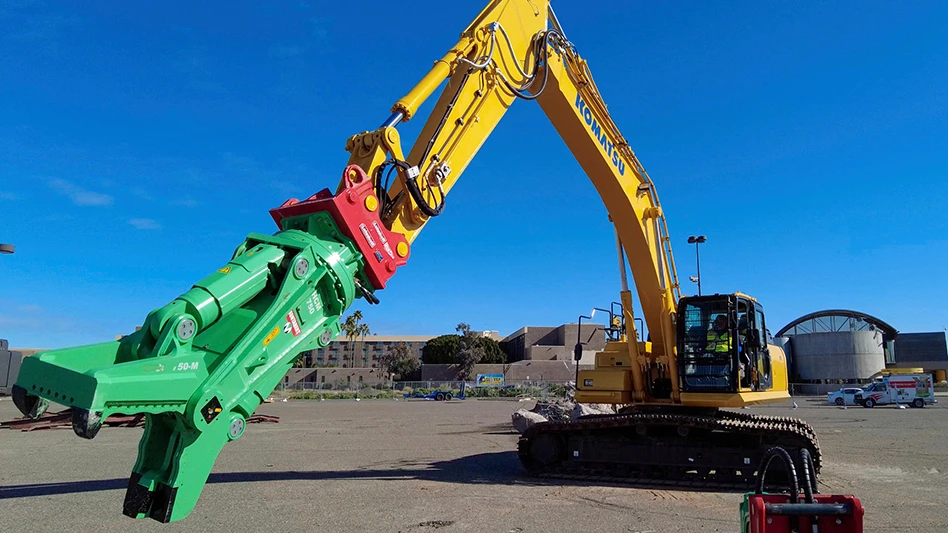
Ties 2, Superior, Wisconsin, upgraded to a Newtown, New Hampshire-based Continental Biomass Industries (CBI) electric stationary system, causing the company decrease energy costs from $4.50 per ton to $1 per ton. Last year, CBI custom designed and installed an electric stationary system that grinds 600 to 800 tons of railroad ties on a daily basis for Ties 2.
Steve Berglund, co-owner of Ties 2, has been grinding ties for more than 20 years with CBI machines and has been a key source of design input. In 2016, he upgraded from a diesel system that produced 75 tons an hour to an electric system that produces 125 to 150 tons an hour, all while reducing costs associated with energy, labor and maintenance.
“With fuel and related costs of the diesel machine we were at $4.50 a ton and our goal was to get to a dollar a ton for energy cost, we’ve done that with our system,” Berglund says. “If you’re just going to isolate the energy savings, it would be about $400,000. The electrical system requires less maintenance and because it’s faster your labor cost is going to go down by default.”
Railroad ties, by design, are created from the hardest wood possible for the sake of durability. CBI manufactured its largest ever CBI Grizzly Mill primary grinder for the Ties 2 application, providing a 60 inch by 60 inch solid steel rotor that brings optimal energy to the initial grind. Following the primary grind, the ground ties pass through a magnet to ensure all existing metal is removed before moving onto the CBI Prescreener. Any material that the screener identifies as oversized is then passed through a CBI Grizzly Mill secondary grinder (48 inch by 72 inch rotor). The end product, which looks very similar to the average homeowner’s landscaping mulch, is transported to Minnesota Power and Excel Energy to generate more renewable energy for nearby regions.
“One thing I would say about this system is that if you’re going to try and make the investment—and you’re not trying to do it on the cheap, but you’re going to make the several million dollar investment—this is the way to go bar none,” Berglund says.
Steve Berglund, co-owner of Ties 2, has been grinding ties for more than 20 years with CBI machines and has been a key source of design input. In 2016, he upgraded from a diesel system that produced 75 tons an hour to an electric system that produces 125 to 150 tons an hour, all while reducing costs associated with energy, labor and maintenance.
“With fuel and related costs of the diesel machine we were at $4.50 a ton and our goal was to get to a dollar a ton for energy cost, we’ve done that with our system,” Berglund says. “If you’re just going to isolate the energy savings, it would be about $400,000. The electrical system requires less maintenance and because it’s faster your labor cost is going to go down by default.”
Railroad ties, by design, are created from the hardest wood possible for the sake of durability. CBI manufactured its largest ever CBI Grizzly Mill primary grinder for the Ties 2 application, providing a 60 inch by 60 inch solid steel rotor that brings optimal energy to the initial grind. Following the primary grind, the ground ties pass through a magnet to ensure all existing metal is removed before moving onto the CBI Prescreener. Any material that the screener identifies as oversized is then passed through a CBI Grizzly Mill secondary grinder (48 inch by 72 inch rotor). The end product, which looks very similar to the average homeowner’s landscaping mulch, is transported to Minnesota Power and Excel Energy to generate more renewable energy for nearby regions.
“One thing I would say about this system is that if you’re going to try and make the investment—and you’re not trying to do it on the cheap, but you’re going to make the several million dollar investment—this is the way to go bar none,” Berglund says.
Get curated news on YOUR industry.
Enter your email to receive our newsletters.Loading...
Latest from Construction & Demolition Recycling
- Cielo investor requests annual meeting
- CDE sets up washing plant on Long Island, NY
- NWRA: NIOSH cuts a step in the wrong direction
- Ferrous price hikes could be poised to pause
- Northstar secures 15-year lease extension for asphalt shingle recycling facility
- Greenwave asks for SEC filing extension
- Construction Plastics Initiative lines up projects
- ShearCore adds dealership group in Canada





